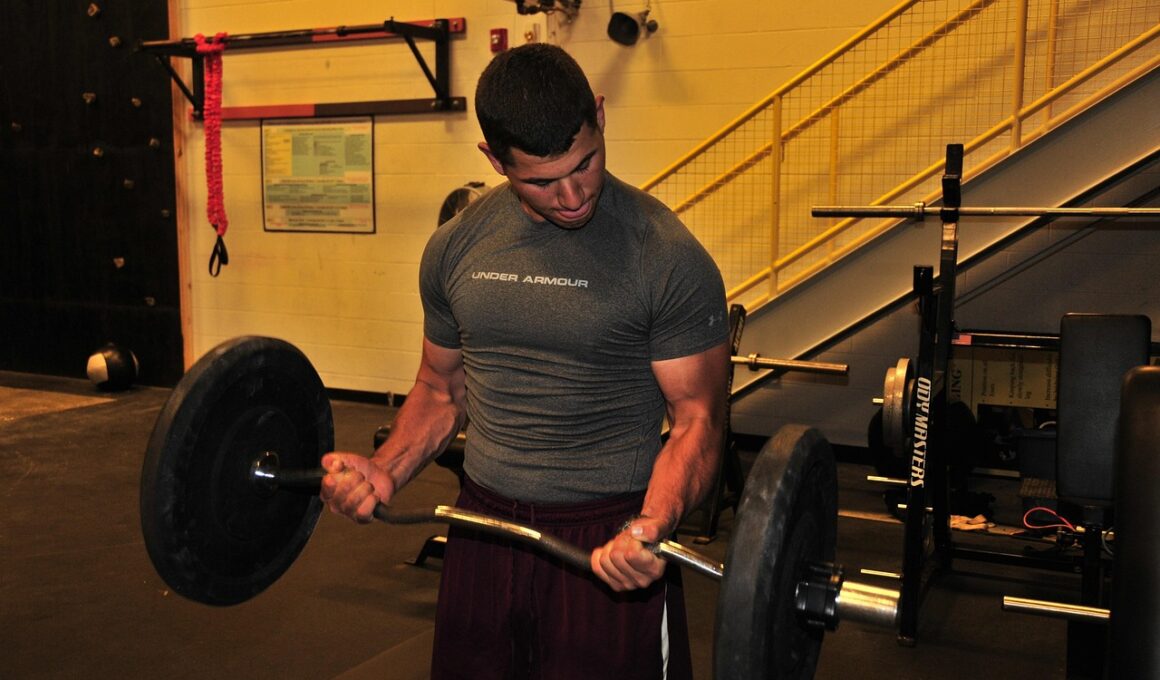Strategies to Push Past Fatigue During Cardio Workouts
When engaging in cardiovascular training, fatigue can quickly set in, making it challenging to sustain your workout. To effectively manage this fatigue, it’s critical to develop tailored strategies suited to your personal goals and fitness levels. Firstly, always ensure a proper warm-up session before diving into intensive cardio. Warm-ups gradually increase heart rate and blood flow, preparing your body for the demands of the workout ahead. Contemplate adding interval training to your routine; alternating between high and low-intensity efforts can dramatically enhance your endurance over time. Additionally, consider listening to compelling music or podcasts as an effective distraction from fatigue. Studies suggest that motivational audio can increase the effort one puts into workouts significantly. Stay hydrated and fuel your body wisely with high-energy foods, which can provide the necessary nutrients that combat fatigue during intense training sessions. Moreover, setting achievable short-term goals can keep you focused and motivated throughout your workout, encouraging you to push through discomfort. Lastly, consider strength training as a complement to your cardio workouts, which can improve overall fitness and reduce fatigue during cardiovascular activities.
One effective way to stave off fatigue during cardio is by focusing on your breathing techniques. Proper breathing ensures that your muscles receive adequate oxygen, which is crucial for maintaining performance levels. Learn to breathe rhythmically, inhaling through your nose and exhaling through your mouth, establishing a pattern that aligns with your movements. Furthermore, incorporating visualization techniques can significantly empower your mental state. Picture yourself crossing the finish line or reaching a training milestone, centering your thoughts on success, rather than the discomfort you might be feeling. Another valuable practice is the use of positive affirmations. Repeating encouraging phrases while training can bolster your determination and help you push through challenging moments. Engaging in group workouts is also beneficial, as the camaraderie can heighten motivation and provide support. Track your progress consistently, either through a journal or an app, as seeing improvements can fuel motivation to continue, even when fatigue threatens to set in. Lastly, avoid comparing yourself to others. Everyone has a unique fitness journey, and focusing on your progress will keep your mindset healthy and allow you to overcome challenges effectively.
Utilizing Proper Gear and Environments
Your workout environment and gear can also play a significant role in overcoming fatigue during cardio workouts. Ensure that you have well-fitted, high-quality footwear designed for your chosen activity; inadequate shoes can lead to discomfort and fatigue. Consider investing in moisture-wicking clothing to keep you cool and dry, enabling you to focus better on your performance. Maintaining a conducive exercise environment is vital, too; select venues with good ventilation, and consider varying your locations to keep your workouts fresh and stimulating. Outdoor runs or cycling can offer refreshing changes compared to indoor sessions, which may feel repetitive over time. Moreover, consider the time of day when scheduling your workouts; some people find they have more energy in the morning, while others may thrive in the evening. Experimenting with different times can help identify when you feel most vibrant and capable of pushing beyond fatigue. Lastly, utilize technology to elevate your experience; fitness trackers can provide real-time feedback, allowing you to monitor your performance level closely. This information can help you adjust your efforts, ensuring you stay motivated even when your body feels weary.
To enhance your cardiovascular training and minimize fatigue, proper recovery practices are essential. After completing your workout, do not neglect the power of cool-down exercises. Cooling down gradually brings your heart rate back to normal, aiding in recovery and reducing muscle stiffness. Engage in stretching exercises to promote flexibility and endurance, which can help alleviate the tension that builds during intense workouts. Emphasizing sleep quality and relaxation techniques also plays a crucial role in combatting fatigue. Aim for seven to nine hours of quality sleep nightly, as this is when your body performs vital repair processes. Incorporating practices like yoga or meditation can also help clear your mind and reduce stress, which is essential for motivation. Consider post-workout nutrition patterns as well; replenishing your body with the right blend of protein and carbohydrates aids muscle recovery and can leave you feeling invigorated for your next session. Staying consistent with your training schedule without sacrificing recovery is vital to long-term success. Therefore, always listen to your body and make adjustments when needed, ensuring that you remain engaged in your fitness journey over time.
Understanding Mental Barriers
Identifying and addressing mental barriers is crucial for overcoming fatigue during cardiovascular workouts. Often, fatigue is not solely physical; it can stem from mental fatigue, which can be debilitating. Start by reflecting on the psychological aspects of your workouts, recognizing patterns of negative self-talk that may arise. The way you perceive pain and discomfort can greatly affect your endurance. Implementing techniques such as mindfulness can help in managing your thoughts, allowing you to focus on the present moment instead. Consider creating a list of personal motivators that remind you why you chose this fitness journey. Keeping these sources of inspiration in mind can rejuvenate your drive when fatigue sets in. Moreover, seeking external support—such as friends or fitness communities—can foster accountability and encouragement, providing motivation when you feel like quitting. Sharing experiences with others facing similar challenges can create an uplifting environment, reaffirming your perseverance. Lastly, remind yourself that progress takes time. Emphasizing small victories over time offers a more sustainable perspective, making it easier to navigate the fatigue that comes with challenging workouts.
Regularly incorporating variety into your cardio workouts is another effective strategy for pushing past fatigue. Boredom can exacerbate feelings of fatigue, leading to a decrease in enthusiasm for your fitness routine. To combat this, aim to mix different cardio activities each week. Instead of running daily, consider incorporating cycling, swimming, or group fitness classes into your regimen. This variety can re-engage your interest while also challenging different muscle groups, enhancing overall fitness. Additionally, set up unique challenges, such as training for a specific race, which can provide a purposeful objective on the horizon. Training with a friend or partner may also amplify motivation, as friendly competition can push both of you to new limits. Engaging in outdoor activities can also invigorate your experience, allowing you to connect with nature while exercising. Seasonal changes can present opportunities for new forms of training that keep things exciting. Finally, don’t hesitate to explore new fitness trends or classes offered in your community, discovering styles that resonate with your preferences and pushing through fatigue with renewed energy and excitement.
Conclusion: Overcome Fatigue with These Strategies
In conclusion, effectively managing and pushing past fatigue during cardiovascular workouts can be accomplished through a variety of approaches. Implementing strategies such as interval training, proper nutrition, and hydration can significantly enhance your workout experience. Establishing a positive mindset through affirmations and visualization can empower you mentally, while creating rewarding short-term goals ultimately helps maintain motivation. Emphasizing proper gear and training environments can transform discomfort into enjoyable experiences, reinforcing your commitment to physical fitness. Don’t underestimate the importance of recovery and mental barriers, as they can impact endurance. Prioritize adequate sleep, cooldown practices, and overall mental health to create a balanced approach to your training regimen. Make sure to introduce variety into your workouts to keep your routine fresh and exciting, breaking the monotony that can contribute to fatigue. With these strategies in hand, you will be better equipped to navigate challenges in your cardiovascular training journey. Armed with determination and the right techniques, you can conquer your workouts with resilience, ultimately uncovering the many rewarding benefits of persistent cardiovascular fitness.


